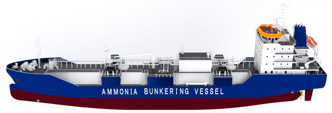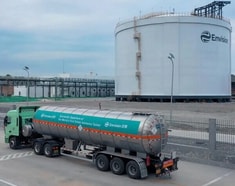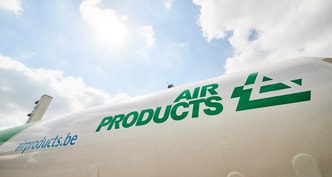An African Afternoon
Following a refreshing lunch, courtesy of Union Engineering, 110 members of the industrial gases community congregated for an afternoon brimming with information, discussion and debate.
Proceedings were initiated by Graham Hunter, Managing Director of CryoGas Express. Hunter provided listeners with a vivid narrative about the benefits of bulk distribution; delegates were even treated to an unexpected image of gasworld Managing Director, John Raquet, in a somewhat compromising position! But as they say, ‘what goes on tour, stays on tour’.
On a more serious level, Hunter offered the audience an overview of the new technology that is now available to meet the challenges presented by distribution in Africa. This is perhaps best illustrated by innovative vacuum and perlite insulation to enable minimal losses in extremely warm conditions, such as those present across regions of Africa. Hunter wasn’t shy of discussing the difficulties of his trade none-the-less. He commented, “We all know that road transportation is very expensive, however it is not as expensive as sending a product over from India or Singapore with only 50%, or sometimes no product at the end.”
Using CryoGas Express as an example, Hunter explained the intricacies of his trade, “While in-house distribution offers advantages such as the fact that assets are your own and it is under your own control; out-sourcing also offers a number of benefits. It is someone else’s risk, there are no staffing issues, maintenance is preferable as it rests with a different company, and there is no capital and high productivity. High productivity is best shown through efficiency which in out-sourcing equates to a 30-40% increase in speed.”
“You might ask why this is the case, and it’s mainly because we offer high incentive based re-numeration for the drivers, who receive a base rate but can make up to $4300 USD per month, which is a substantial wage. The monetary increase is measured on a number of factors; we measure driver safety, harsh braking through satellite tracking systems and tons delivered against km travelled.”
Hunter’s presentation was perhaps best summed-up by John Raquet, Managing Director of Spiritus Consulting who added, “Graham is pretty optimistic that supplying bulk liquids through Africa is doable, but the technology involved and the efficiency needs to meet very high standards.”
The subsequent Q and A session revealed that delegates were keen to tackle the more complex issues surrounding the industrial gases sector. The following afternoon session took a particular turn towards the specialised sector, when Shuaib Fareed, Business Development Manager at Afrox, offered a run-down of medical supply alternatives.
Fareed began by emphasizing the importance of medical gases, “I would like to state the obvious, a person can live three minutes without water, three weeks without food but barely three minutes without oxygen.”
According to Fareed the key ingredient to successful medical gases business in Africa is in the introduction and adherence to regulatory guidelines. He said, “Currently only South Africa, and Zimbabwe are looking to adopt the EU pharmacopoeia guidelines. Challenges remain for the rest of sub-Saharan Africa and growth depends on ensuring that we have these regulatory councils and that all manufacturers of medical gases have the correct licenses. And furthermore that licenses can be reviewed and revoked according to periodic surveillance.” Fareed also drew attention to contemporary developments in regulations, “A further development has come to the fore, where we have started looking at things like regulators and cylinder valve regulators.”
Both Fareed and Hunter’s interest in sector challenges were reflected by delegates who began a heated Q and A session, tackling everything from tricky issues such as the viability of in-house oxygen plants to hospitals in developing regions. Nevertheless Fareed was keen to highlight the real crux of the matter.
He concluded the afternoon’s debate, “The focus should not deter us from the fact that the patient is a human life, the first world standards should consciously be applied to any medical supplier in any country. Of course we do know some compromises are being made, and yes there are challenges, for instance we may not necessarily have the infrastructure available to supply a very high purity product, but yet again we need to be vigilant about the fact that it is not the ultimate solution. That to my mind, it is an interim solution.”
And so the first day drew to a close, proving to live up to the gasworld mantra: ‘discuss, debate, converse.’
Indeed, thanks to Carbacid who are sponsoring the Gala Dinner, delegates will have even more opportunity to converse in preparation for the second and final conference day, where John Raquet advises a ‘real rolling-up of the sleeves’ as attention turns to weighty topics.
... to continue reading you must be subscribed









